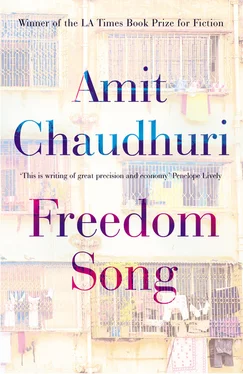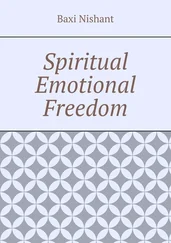How could I be happy at home?
For if my Shyam has become a yogi
Then as a yogini with him I’ll roam.
Her husband loved this song; he sat listening to it very solemnly, as if he had a hot potato in his mouth.
Then:
But if it’s earth he wants
Then I’ll be the earth at his bright feet
For the love of my beloved.
Always the song returned to its first three lines, where lay its home and heart, its original question and its answer:
Aami ki shukhe lo grihe rabo?
Aamar Shyam jodi ogo jogi holo shokhi
Aamio jogini hobo.
Twice a week, Suleiman Hussein came to play the tabla with Khuku. He was something of a dandy; he had a trimmed white beard which he dyed black before major musical performances. A slim man with a small paunch, he wore a different kurta with his white churidars whenever he could, and a black Kashmiri sleeveless jacket in the winter; he was irritating — but punctual. ‘Didi!’ he would cry out at four o’clock, whether Khuku was sleeping or not, ‘Didi, don’t you want to start?’ ‘So you’ve arrived exactly on time again — like Yama, the god of death.’ Suleiman would blink. Then he would begin to cackle with laughter, the sides of his eyes crinkling and his cheeks swelling and flushing. ‘Yama! Didi — Yama! He Ram, he Ram!’ Khuku grew impatient when Suleiman laughed at her jokes; she waited equanimously for him to finish. Then a place in the hall was cleared for them by Jochna, and Suleiman yawned, stretched his arms, and began to tune the tabla on the right with a hammer. And Mini watched owlishly from an arm-chair, waiting for Khuku to begin.
The house, if it could be called such, was a small stone structure with an asbestos roof.
They were standing before it, one or two of them leaning against the wall that was mapped with a few discoloured patches where the paint had come off; on a tin plate above the door was painted a hammer and sickle in orange, and the letters and numbers: C.P.I.(M.) UNIT 69. Sumanta Saha, a huge lumbering man, had disappeared to the side of the house to urinate into the gutter. Matches were struck against the sides of match-boxes, they rasped, a smell of sulphur sprang into the air, and, patiently, filterless Charminar cigarettes were lit, and their ends dimmed and began to burn. Bhaskar inhaled deeply, contemplated the distance, then exhaled a stream of smoke slowly from his nostrils. He still found a boyish pleasure in smoking — it was something he had discovered twelve years ago with another group of friends — it made him feel solitary, asocial, alone, in communion with the smoke entering and leaving him, but it was not something he did before his parents or relatives. ‘Ei — ei, Bhaskar,’ said Arun Nashkar, a barely audible whine in his voice. ‘Ei — do you have one?’ Bhaskar stirred unhappily. ‘Dhur,’ he said. ‘You never bring your own.’ ‘I’m trying to stop,’ said Arun Nashkar sagely. The other’s hand vanished into a trouser pocket, retrieving something therefrom, a crumpled golden-coloured cigarette packet which he held out to Arun Nashkar. ‘What for?’ he asked. But Arun Nashkar did not answer, for he now had a cigarette in his mouth, and Bhaskar had handed him, with the tired air of one who is under a compulsion, his own cigarette to light his with; the cigarettes kissed for a long moment, Arun Nashkar’s eyes narrowed and his cheeks hollowed, and then reluctantly, heavily, they parted, Bhaskar took back his and returned it to his mouth, Arun Nashkar breathed and a mist of smoke partially hid his face.
The day was warm, and yet they felt insulated in their slip-overs. Many of them had congregated on the pavement to absorb the sunlight, their hands cupped around bhaads of tea. The meeting was over; Samaresh Hajra had made a speech about the International Monetary Fund, beginning, ‘Friends. . comrades. . our country has opened its doors to the imperialists again. .’ But now that the meeting was over the room was empty and the doors ajar. When they had come into the room, they had opened the windows on either side, easing down the locks at the top that squeaked when they were moved. Now the dung-smoke that had entered the room during the meeting hung quietly in it. Mosquitoes that had drifted in during the talk still wandered about, searching a human smell. On the young Party members’ arms they had left tiny red pustulations; all through the talk there had been the sound of agitated slapping. And, in the poster, Lenin’s eyes, above his neat beard and below the dome of his bald head, shone humorously. Here, in the deep green humid Gangetic delta in Bengal, among jack-fruit trees, malaria, and bluebottle flies, was one of the last Socialist governments in the world, and here, in a lane ten minutes away from Ishwar Chandra Vidyasagar Road, was one of its local outposts. ‘Ours is an economy of small businesses, small enterprises,’ Samaresh Hajra had said. Dramatically, he had taken a fountain-pen out of his pocket. ‘This pen is made in our country, India. It may not write as well as a Parker, it may not write at all after a few days’—there was laughter—‘but we have made it ourselves.’ What Samaresh Hajra had told them was true — that foreign investment was dangerous to India, though the bourgeoisie, whose needs had made India bankrupt in the first place, were looking forward to it. Then a head had peered in through the door. ‘Dada, should I bring tea?’ It was the Bihari boy who worked in the tea-shop on the opposite side of the road. During the summer he wore only khaki shorts, and his brown skin shone, but now his head with its crop of dry hair stuck out from a shawl which hung down loosely from his shoulders. The meeting had ended five minutes later. They had trooped out through the door, onto the pavement, cigarettes had been lit, and Narayan, who had shot off, returned, still running, with bhaads of steaming tea on a tray.
Dipen Mandal was a singer and the youngest of that group. He wouldn’t have been more than twenty-one years old, and still had no moustache or beard. His mother had died when he was a child, and he had been brought up by his father and aunt; he loved new clothes, and today he was wearing a white shirt with broad collars and light blue trousers with narrow flares. He was just a boy, really, and couldn’t keep his eyes off the two sisters in saris who stood on the balcony of the house on the other side of the road. His father, who always wore clean, starched dhotis and kurtas, was a singer too, but perhaps better known as a revolutionary poet who had published two volumes of verse in his youth; both father and son had been present in that long, winding procession pledging support to Cuba and Castro that had gone down from Tollygunge to BBD Baag in September. Dipen was the only one among this group who didn’t like tea and didn’t smoke because of his voice. He was serious about his singing; he took lessons in classical music from a guru; he practised in the mornings. Sometimes it seemed that he was more interested in singing revolutionary songs than in Party work, but the others in the group were indulgent towards him and treated him like a younger brother and called him Deepu. Standing on the pavement, keeping at an arm’s length from the rest, he was humming a vocal exercise, ‘Sa re ga, re ga ma, ga ma pa. .’ Deeply engrossed, peacock-proud, he uttered the first line of a patriotic song: ‘O unlock this, unlock this, unlock this door of darkness!’
What happy times they had together! There were dress rehearsals, processions, demonstrations, street-plays, adult education for the illiterate, Dipen Mandal breaking into ‘Sing Cominternational’ on May Day to the accompaniment of his single-reed harmonium. They had all grown up on the border that separated middle-classness from a fathomless darkness, on the border where a street of middle-class houses ran out to the railway lines and the makeshift huts beyond, the fathomless cricket- and firefly-haunted darkness in which paraffin lanterns were lit; all their lives they had barely managed not to slip off from their haven of school-books and exams. Samaresh Hajra had a younger sister, two brothers in school, and his mother was a widow; for the last two months he had had no job. He was the one who had spoken today of the International Monetary Fund. Only Bhaskar, perhaps, among them, could be said to have come from a family that was properly middle class; thus, there was an ineffable aura about his ordinariness — he was held in respect.
Читать дальше












